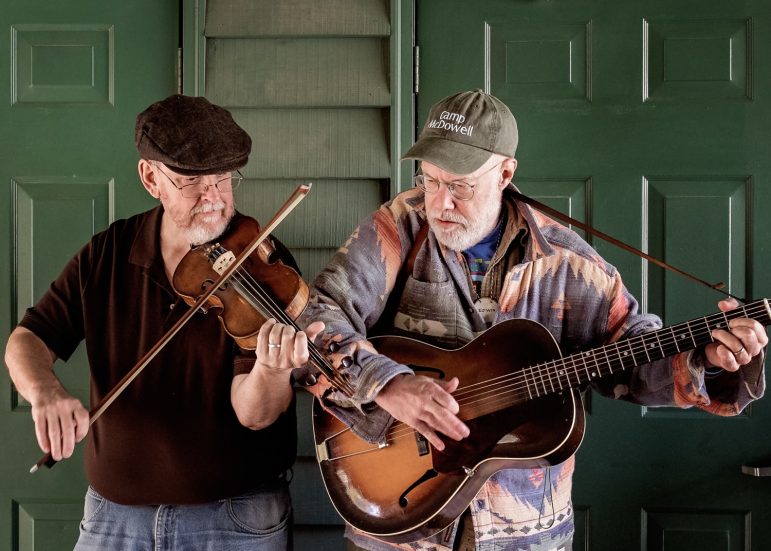Alabama has a rich folk history, full of songs, stories and primitive arts and crafts. For years, the Alabama Folk School has brought them to life through a year-round teaching program at Camp McDowell, the camp and conference center for the Episcopal Diocese of Alabama.
The Alabama Folk School recently appointed a new director, and Camp McDowell itself has seen some major changes and renovations in the past year. Camp McDowell’s executive director Mark Johnston starts his tour with the camp’s newest residents.
“See our pigs? Some of our pigs. We got a bunch of babies over here. Aren’t they cute?” says Johnston, showing off the new Teaching Farm at the camp in Winston County.
“These are apple and pair trees we stuck in the ground, not this winter, but the winter before,” Johnston adds. “These are our laying hens over here.”
Johnston says the Teaching Farm is intended to teach young people where their food comes from. The farm also provides fresh produce and eggs for use in the camp dining hall. Johnston says the stop is the Dance Hall (We did mention this is an Episcopal Church camp, after all).
“The Folk School does concerts and dances in here. But during special sessions, we’ll do a talent show and dance for typical kids and for kids with disabilities.” Johnston points out that the wooden structure is constructed from lumber harvested on the campgrounds.
According to Johnston, the inspiration for the camp goes back to his youth. “When I graduated from college, I moved up to the mountains of North Georgia where my grandparents were from and I spent a lot of time there in the summers.”
Johnston says the arrival of the Foxfire Book in 1972 caught his attention. The book was a compilation of articles about the folklore of the Southern Appalachians. “I became enamored with a lot of the lore and crafts and art that had been so prevalent in the mountains that were being lost. And when I came to Camp McDowell I had a dream of bringing those arts here.”
That dream was realized in 2007 with the first class of the school.
The Alabama Folk School offers monthly workshops on activities are varied as blacksmithing, chair caning and Cajun cooking. In addition to the Dance Hall, new facilities include a visual arts studio and a teaching kitchen.
The session running this week called Blue Grass and Gees Bend gives attendees the opportunity to improve their chops on guitar, mandolin, fiddle and banjo. Stephen Mochin of the Sam Bush Band is one of the instructors. Quilters will get hands on training from the quilting pros from Gees Bend.
When he’s not selling insurance, Jack Tomlinson of Mountain Brook, Alabama, is a banjo picker.
“(Alabama Folk School was) An unbelievable experience for me,” says Tomlinson, reflecting on his time at Alabama Folk School. WBHM caught up with Tomlinson during his banjo lesson at a Birmingham music store. He participated in the Bluegrass and Gees Bend session a few years ago and it was a transformative experience for him. The concert put on by the school instructors was especially powerful.
“The show-stopper was the quilters from Gees Bend. They all sing in the choir at Gees Bend and their part of the show, they sang and everybody just…it was unbelievable. It keeps the heritage going in Alabama. The craft part of it and music part of it. I love it.”
“Alabama has a rich folk history of utilitarian art created from everyday objects and opportunities,” says Lisa-Marie Ryder, the new director of the Folk School. Ryder believes the Folk School fosters a supportive community for those who want to preserve Alabama’s cultural heritage.
“That includes quilts and rugs from old clothing or musical instruments from discarded tools and stories and lessons taught through song. Now, we’re seeing these skills taught for generations largely disappeared from our modern culture,” Ryder says. She believes the Folk School can help to preserve and honor those traditions.
Along with the Environmental Education Center and the Farm School, Mark Johnston hopes the Folk School can offer visitors the opportunity to not only reconnect with lost traditions, but also to consider what it means to live a more sustainable life.
“At camp we like to think of our place as the way the world could be. I think and I hope when they come here to Camp McDowell and they live in that wonderful spiritual community and they build new relationships and enhance old ones, what happens is when they leave here that they will want to live that same way at home.”

